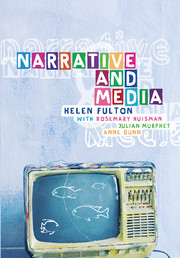Book contents
- Frontmatter
- Contents
- Figures and tables
- Contributors
- Acknowledgements
- 1 Introduction: the power of narrative
- Part 1 The basics of narrative theory
- Part 2 Film as narrative and visual mode
- Part 3 Television: narratives and ideology
- 10 The genres of television
- 11 Television news as narrative
- 12 Aspects of narrative in series and serials
- 13 Soap operas and sitcoms
- Part 4 Radio and print journalism
- Part 5 Popular print culture
- Glossary
- Bibliography
- Index
13 - Soap operas and sitcoms
Published online by Cambridge University Press: 05 June 2012
- Frontmatter
- Contents
- Figures and tables
- Contributors
- Acknowledgements
- 1 Introduction: the power of narrative
- Part 1 The basics of narrative theory
- Part 2 Film as narrative and visual mode
- Part 3 Television: narratives and ideology
- 10 The genres of television
- 11 Television news as narrative
- 12 Aspects of narrative in series and serials
- 13 Soap operas and sitcoms
- Part 4 Radio and print journalism
- Part 5 Popular print culture
- Glossary
- Bibliography
- Index
Summary
Ideology
In chapter 2 I introduced the concept of the Umwelt, to describe human understanding of reality, the objective world (in a Peircean sense) of experience and imagination. The term ‘ideology’ is variously used, but here it is used to mean the perspectives that a person takes up towards his or her Umwelt, the ethical values that seem unproblematic, unarguable, objectively ‘natural’ in her or his world. In ‘A Policeman's Lot’, chapter 12 of their book, Reading Television, John Fiske and John Hartley discuss the ideology of several police series of the 1970s: A Man Called Ironside, The Sweeney, Starsky and Hutch. I quote their specific comments on Ironside to exemplify the general concept of ‘ideology’ in the sense above:
Ironside's team is presented as a harmonious society – part hunting party out of American mythology, part microcosm of Western class structures. But in terms of the way this ‘society’ is presented in the series itself, Ironside's team derive their satisfying meaning not only from their metonymic reference but also by binary opposition to each other:
male: female
white: black
cerebral: physical
age: youth.
The left-hand set of terms show the ‘esteemed’ or dominant values of this series. It is interesting to notice how the integration of these values into a harmonious society is presented as natural, and this offers us a graphic example of what Barthes terms the ‘ex-nominating’ process that operates in the ideology of our society. […]
- Type
- Chapter
- Information
- Narrative and Media , pp. 172 - 188Publisher: Cambridge University PressPrint publication year: 2005



